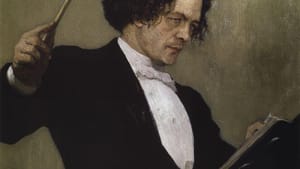Stay in the Loop
BSR publishes on a weekly schedule, with an email newsletter every Wednesday and Thursday morning. There’s no paywall, and subscribing is always free.
The Demon comes to Philadelphia
Russian Opera Workshop present Rubinstein's 'The Demon'

Don’t be embarrassed if you’ve never heard of Anton Rubenstein. The director of the Russian Opera Workshop, Ghenady Meirson, says none of his students had ever heard of Rubenstein either.
To begin with, he isn’t Arthur Rubenstein, the famous 20th-century Polish pianist; he’s a 19th-century Russian pianist and composer who founded the St. Petersburg Conservatory and taught both Tchaikovsky and the third director of the Curtis Institute of Music, Josef Hofmann. When he toured the United States during the 1872-3 season, Rubenstein presented over 200 concerts.
In his introductory remarks before the workshop’s production of Rubenstein’s Demon, Meirson noted though the workshop was presenting the first Philadelphia performance of the work, it’s a popular work in Russia, where the composer is a favorite. During one of Meirson’s trips to Moscow, he discovered two productions of the opera were being performed at the same time.
No musical opportunities lost
The workshop performance made it easy to understand the Russian enthusiasm. Rubenstein possesses one of the classic virtues of the opera composer: He never wastes an excuse to throw in an aria or a good chorus. Young Prince Sinodal is making camp for the night when we first meet him, so naturally his servants launch into a rousing men’s chorus, with salutes to drinking and firelight. When the prince’s personal retainer tells them they’re camping on haunted ground and should be less boisterous, they shift to a bedtime chorus that’s equally musical. Earlier, Princess Tamara’s maidens introduce her first scene with beautiful female harmonies sung by a river. Most of the solos are just as good. The prince’s aria in praise of his future wife is the kind of tenor love song we would all like to be able to sing.
The plot places The Demon in a familiar genre. The fallen angel responsible for all the evil in the world falls in love with a pure young woman and tries to win her love. I’m not sure why characters like him fall for that kind of woman. If I were a demon, I’d pick somebody who would be happy helping me wreak havoc on humankind. But I’m not Lucifer — or King Kong — so critical aspects of the demonic personality may elude my capacity for psychological insight.
Strangely enough, the opera works rather well dramatically. The demon seemed a bit conventional when he raged in his opening scenes, but he became more interesting when he turned seductive. The long final duet between him and Tamara, as he struggles for her soul, reaches a powerful dramatic peak.
The magic of Russian opera
The Russian Opera Workshop is the latest development in Ghenady Meirson’s personal campaign to encourage Russian-language opera. Students from all over the world sharpen their knowledge of Russian by workshopping two operas and presenting free concert-style performances. The public performances have a pleasantly informal quality, but there is nothing casual about the execution. The students are all talented young people who obviously understand one of the great truths of the arts: You develop your talent by giving every performance your best shot.
Meirson backs them up with a marathon nonstop piano accompaniment and the little touches that make audiences feel the management has everything under control. The translation titles, for example, are projected on a large monitor, with a well-chosen font and pictures to accompany the scene changes.
Subtitles are obviously necessary, but they have their drawbacks. When I watch movies with subtitles, I don’t really hear the foreign language. I watch the action and read the words. I have a similar experience when I watch operas accompanied by titles. I read the translation and hear the music, but I don’t hear the language.
At this performance, however, I had a magical experience: I heard the Russian all the way through. The titles on the screen became an adjunct I glanced at just to see what the Russian meant. I could feel the rhythms and the sensuous quality of the Russian language.
Did that happen because of the workshop’s emphasis on the language? Whatever the reason, it’s a wonderful way to hear an opera.
What, When, Where
Russian Opera Workshop: Rubenstein, The Demon. Vartan Gabrielian, bass-baritone (Prince Gudal). Rachel Rosenberg, soprano (Tamara). Andrew McGowan, tenor (Prince Sinodal). Raymond Storms, countertenor (Angel). Cairee Mayfield, baritone (Demon). Russian Opera Workshop Chorus; Julia Zavadsky, Chorus Master. Ghenady Meirson, Music Director and piano. June 23, 2015 at Academy of Vocal Arts, 1920 Spruce Street, Philadelphia. http://www.russianoperaworkshop.com
Sign up for our newsletter
All of the week's new articles, all in one place. Sign up for the free weekly BSR newsletters, and don't miss a conversation.

 Tom Purdom
Tom Purdom